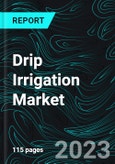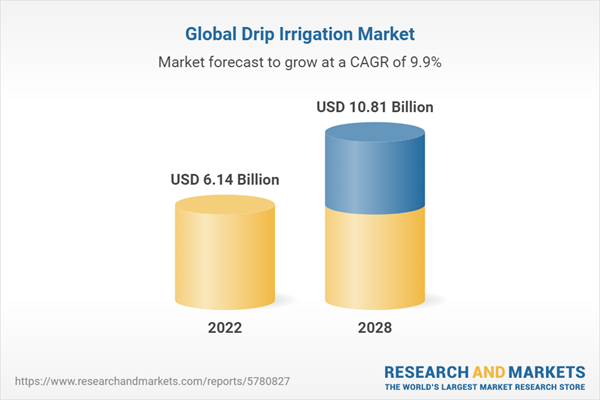Global Drip Irrigation Market will be to US$ 10.81 Billion by 2028
Global Drip Irrigation Market will be to US$ 10.81 Billion by 2028, according to the publisher. Artificial methods of watering land are referred to as irrigation. Agriculture is heavily dependent on irrigation as natural water sources like floods or rain may be unreliable or limited. Drip irrigation is recognized as the most efficient technique as it allows for precise and uniform application of water and nutrients. Drip irrigation technology can help farmers adapt to climate change by enabling efficient water use. This is particularly useful in areas that are vulnerable to climate change impacts like seasonal droughts, where drip irrigation reduces water demand and evaporation losses. Moreover, the worldwide drip irrigation market is driven by the increasing adoption of micro-irrigation systems, technological advancements in the agriculture industry, and growing awareness of modern farming techniques and irrigation systems.
Global Drip Irrigation Market is estimated to grow with double digits CAGR of 9.89% from 2022 to 2028
Encouraging the adoption of drip irrigation systems can have several benefits, including promoting efficient water usage, reducing fertilizer requirements, and increasing soil productivity. This technique is particularly well-suited for areas that experience water scarcity, either permanently or seasonally, as farmers can select crop varieties that are adaptable to these conditions.
However, implementing drip irrigation systems will require investment in building workers' capacities to effectively manage maintenance and water flow control. For example, the drip tape or tubing needs to be carefully maintained to prevent leaks or blockages, and emitters require regular cleaning to avoid clogging from chemical deposits. Global Drip Irrigation Market was US$ 6.14 Billion in 2022.
Global Increase in adoption of Drip Irrigation Systems can be attributed to a range of Factors
The issue of water scarcity has led to an uptick in the implementation of this irrigation method, as it delivers water directly to the roots of plants, thus minimizing water waste and conserving this vital resource.
Drip irrigation systems have been shown to enhance crop yield and plant health, as they provide water and nutrients directly to the roots. This method of irrigation promotes environmental sustainability, as it curtails water waste and reduces carbon emissions, thereby contributing to energy conservation efforts.
Drip irrigation systems are highly efficient and require less labor than traditional irrigation techniques, thereby improving efficiency and boosting productivity.
Various governments across the world are offering incentives and support to encourage the uptake of drip irrigation systems, including subsidies, tax breaks, and technical assistance.
Field Crops will capture Highest Market Share in Global Drip Irrigation Market
By Crop Type, Drip Irrigation Market is segmented into Field Crops, Fruit & Nuts, Vegetable Crops and Others. Field crops may dominate the drip irrigation market share due to their characteristic of being grown on large and flat land areas, which are ideal for drip irrigation. Moreover, field crops are typically cultivated in areas with water scarcity or drought, making drip irrigation a practical and water-efficient option for farmers aiming to optimize their yield. However, the drip irrigation market is expansive and includes various crops like fruits, vegetables, landscaping, and turfgrass, among others. The market share for each crop would be influenced by factors such as soil type, regional climate, and local demand for specific crops.
Drip Tubes have highest market share in year 2022
By Component, Drip Irrigation Market is divided into Emitters, Pressure Pumps, Drip Tubes, Filters, Valves and Others. Drip irrigation, a water-conserving method that delivers water slowly to plant roots, is extensively used in the agriculture industry, and drip tubes are an essential component of this system. These tubes are available in different materials and dimensions and have small emitters that drip water onto the soil surface or directly onto the plant root zone through pipes, valves, and tubing. As the need for sustainable irrigation solutions that reduce water bills rises, the demand for drip tubes is also increasing. Consequently, drip tubes are a significant player in the drip irrigation industry.
Agricultural Irrigation will grow in the upcoming years
By Application, Drip Irrigation Market is sub-segmented into Agricultural Irrigation, Landscape Irrigation, Greenhouse Irrigation and Others. Modern agriculture heavily relies on irrigation systems as they play a crucial role in enhancing crop yields, improving crop quality, sector in the global economy; there is an increasing demand for food to sustain the growing population. Consequently, farmers need to adopt advanced and efficient irrigation technologies to increase their productivity while conserving water resources.
North America is a Significant Player in the Global Drip Irrigation Market
By Region, Drip Irrigation Market is broken up in North America, Asia Pacific, Europe and Rest of the World. Although North America is a significant participant in the global drip irrigation industry, it does not hold the highest market share worldwide. The industry is rapidly expanding in various regions globally, fueled by the growing demand for water-efficient irrigation techniques in agriculture.
Apart from North America, other regions with a noteworthy market share in the drip irrigation industry are Asia-Pacific, Europe, and the Middle East. China, with its enormous population and sizeable agricultural sector, is a leading player in the drip irrigation market in the Asia-Pacific region. Similarly, India has one of the largest drip irrigation markets globally, attributed to its arid climate and the need to conserve water in agriculture. The Indian government has been promoting drip irrigation systems actively, leading to a surge in the industry's growth.
Company Analysis
There are several key players operating in the drip irrigation market, including Lindsay Corporation, Toro Company, Valmont Industries, Alamo Group, and AGCO. These companies provide a range of drip irrigation solutions, including drip tapes, drip emitters, and micro-sprinklers, among others.
The report titled “Drip Irrigation Market, Global Forecast by Crop Type (Field Crops, Fruit & Nuts, Vegetable Crops and Others), By Component ( Emitters, Pressure Pumps, Drip Tubes, Filters, Valves and Others), Application (Agricultural Irrigation, Landscape Irrigation, Greenhouse Irrigation and Others), Regions (North America, Asia pacific, Europe and Rest of the world), Company Analysis (Lindsay Corporation, Toro Company, Valmont Industries, Alamo Group, and AGCO)” provides an all-encompassing analysis on the Global Drip Irrigation Industry.
Crop Type - Drip Irrigation Market
1. Field Crops
2. Fruit & Nuts
3. Vegetable Crops
4. Others
Component - Drip Irrigation Market
1. Emitters
2. Pressure Pumps
3. Drip Tubes
4. Filters
5. Valves
6. Others
Application - Drip Irrigation Market
1. Agricultural Irrigation
2. Landscape Irrigation
3. Greenhouse Irrigation
4. Others
Region - Global Drip Irrigation Market
1. North America
2. Asia pacific
3. Europe
4. Rest of the world
All the Companies have been studied from Three Points
- Overview
- Recent Developments
- Sales
Company - Global Drip Irrigation Market
1. Lindsay Corporation
2. The Toro Company
3. Valmont Industries
4. Alamo Group
5. Agco
Table of Contents
Companies Mentioned
- Lindsay Corporation
- The Toro Company
- Valmont Industries
- Alamo Group
- Agco
Methodology
In this report, for analyzing the future trends for the studied market during the forecast period, the publisher has incorporated rigorous statistical and econometric methods, further scrutinized by secondary, primary sources and by in-house experts, supported through their extensive data intelligence repository. The market is studied holistically from both demand and supply-side perspectives. This is carried out to analyze both end-user and producer behavior patterns, in the review period, which affects price, demand and consumption trends. As the study demands to analyze the long-term nature of the market, the identification of factors influencing the market is based on the fundamentality of the study market.
Through secondary and primary researches, which largely include interviews with industry participants, reliable statistics, and regional intelligence, are identified and are transformed to quantitative data through data extraction, and further applied for inferential purposes. The publisher's in-house industry experts play an instrumental role in designing analytic tools and models, tailored to the requirements of a particular industry segment. These analytical tools and models sanitize the data & statistics and enhance the accuracy of their recommendations and advice.
Primary Research
The primary purpose of this phase is to extract qualitative information regarding the market from the key industry leaders. The primary research efforts include reaching out to participants through mail, tele-conversations, referrals, professional networks, and face-to-face interactions. The publisher also established professional corporate relations with various companies that allow us greater flexibility for reaching out to industry participants and commentators for interviews and discussions, fulfilling the following functions:
- Validates and improves the data quality and strengthens research proceeds
- Further develop the analyst team’s market understanding and expertise
- Supplies authentic information about market size, share, growth, and forecast
The researcher's primary research interview and discussion panels are typically composed of the most experienced industry members. These participants include, however, are not limited to:
- Chief executives and VPs of leading corporations specific to the industry
- Product and sales managers or country heads; channel partners and top level distributors; banking, investment, and valuation experts
- Key opinion leaders (KOLs)
Secondary Research
The publisher refers to a broad array of industry sources for their secondary research, which typically includes, however, is not limited to:
- Company SEC filings, annual reports, company websites, broker & financial reports, and investor presentations for competitive scenario and shape of the industry
- Patent and regulatory databases for understanding of technical & legal developments
- Scientific and technical writings for product information and related preemptions
- Regional government and statistical databases for macro analysis
- Authentic new articles, webcasts, and other related releases for market evaluation
- Internal and external proprietary databases, key market indicators, and relevant press releases for market estimates and forecasts

LOADING...
Table Information
| Report Attribute | Details |
|---|---|
| No. of Pages | 115 |
| Published | April 2023 |
| Forecast Period | 2022 - 2028 |
| Estimated Market Value ( USD | $ 6.14 Billion |
| Forecasted Market Value ( USD | $ 10.81 Billion |
| Compound Annual Growth Rate | 9.8% |
| Regions Covered | Global |
| No. of Companies Mentioned | 5 |









